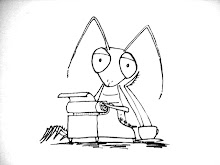So often comparisons are meaningless. By what standard could we say that Segovia is better than Doc Watson, that Twain is better than Hemingway, or that Renoir is better than Picasso? We might as well say apples are better than pears. It would make as much sense.
For that reason, I'm hesitant to pick favorites. Still, if I were forced to choose my favorite author, it would likely be George Orwell. If Animal Farm or Nineteen Eighty-Four is all you know of his work, you owe it to yourself to explore the rest. He wrote on a vast number of subjects, from making a cup of tea to shooting an elephant, all in his inimitable style: an elegant prose, equal parts detachment and warmth, seasoned with his dry English wit.
Certain recent events, both in my life and in the world, have reminded me of a passage from Orwell that is, I think, an important observation. Though many of us might share the general sentiment, Orwell outlines it very clearly. I present it here, and let him speak for himself:
***************
It is worth saying something about the social position of beggars, for when one has consorted with them, and found that they are ordinary human beings, one cannot help being struck by the curious attitude that society takes towards them. People seem to feel that there is some essential difference between beggars and ordinary 'working' men. They are a race apart--outcasts, like criminals and prostitutes. Working men 'work', beggars do not 'work'; they are parasites, worthless in their very nature. It is taken for granted that a beggar does not 'earn' his living, as a bricklayer or a literary critic 'earns' his. He is a mere social excrescence, tolerated because we live in a humane age, but essentially despicable.
Yet if one looks closely one sees that there is no essential difference between a beggar's livelihood and that of numberless respectable people. Beggars do not work, it is said; but, then, what is work? A navvy works by swinging a pick. An accountant works by adding up figures. A beggar works by standing out of doors in all weathers and getting varicose veins, chronic bronchitis, etc. It is a trade like any other; quite useless, of course--but, then, many reputable trades are quite useless. And as a social type a beggar compares well with scores of others. He is honest compared with the sellers of most patent medicines, high-minded compared with a Sunday newspaper proprietor, amiable compared with a hire-purchase tout--in short, a parasite, but a fairly harmless parasite. He seldom extracts more than a bare living from the community, and, what should justify him according to our ethical ideas, he pays for it over and over in suffering. I do not think there is anything about a beggar that sets him in a different class from other people, or gives most modern men the right to despise him.
Then the question arises, Why are beggars despised?--for they are despised, universally. I believe it is for the simple reason that they fail to earn a decent living. In practice nobody cares whether work is useful or useless, productive or parasitic; the sole thing demanded is that it shall be profitable. In all the modern talk about energy, efficiency, social service and the rest of it, what meaning is there except 'Get money, get it legally, and get a lot of it'? Money has become the grand test of virtue. By this test beggars fail, and for this they are despised. If one could earn even ten pounds a week at begging, it would become a respectable profession immediately. A beggar, looked at realistically, is simply a businessman, getting his living, like other businessmen, in the way that comes to hand. He has not, more than most modern people, sold his honour; he has merely made the mistake of choosing a trade at which it is impossible to grow rich.
- George Orwell: Down And Out In Paris And London
***************
Money has become the grand test of virtue. This is no less true now than it was in 1933. It may be more so. Orwell's writings have been called prophetic. This may be true; it may well have been his intent. Yet which prophet is he? If I had to choose, it would not be Jeremiah, but Jonah.
The choice is ours.
Respectfully Yours,
Cricket












4 comments:
Animal Farm is one of my favorites, though -like you said- I need to expand on my reading when it comes to Orwell.
His thoughts on beggars is an interesting take, one I had never thought to consider. As for money has become the grand test of virtue it pains me to acknowledge it, no matter how much truth lies within such a statement. What has become of the world when a person's honesty, integrity, and compassion has taken a backseat to the Almighty Dollar?
A great post!
Michelle - Welcome back and thank you. What has become of the world? I think the world is as it always was, only more so. ;-) Click on the photo for a link to all manner of things Orwell.
thank you for exposing me to this bit of writing from orwell. it's not a piece i ever read before and i must admit woeful ignorance of his works in general. i am now more motivated than ever to remedy that state of affairs.
i very much appreciate his remarks on beggars and i must say there is a great deal of merit to his point of view. i have a few other thoughts percolating in my mind but i lack the necessary clarity to quite express them. but yes, there is definitely an element of "hate the beggar because he works too far outside the accepted values and methods." this attitude reflects faulty reasoning on more levels than just those orwell shares. it assumes every beggar has the choice of whether he'd be a beggar or not so it flies in the face of another american value of pulling yourself up by your bootstraps. but there are societies so focused on class and caste or so lacking in services for those unable to do traditionally acceptable work that such self-improvement is rarely possible.
You most certainly know that I, as a contrarian of the first stripe, adore that piece. Great stuff. I'll admit that my Orwell has been limited to the two you referenced, but I'll have to pick up more of his writings from the library.
(Of course, you tried to prod me in that direction in your "15 Books" piece, but I sometimes take more than one prod to get moving.)
Post a Comment